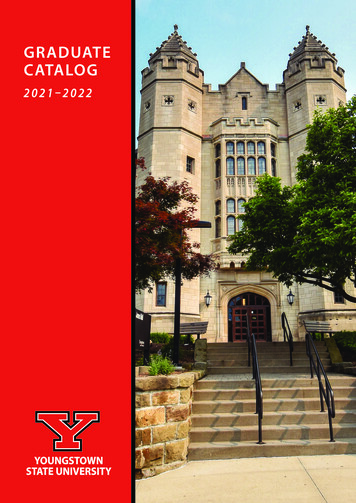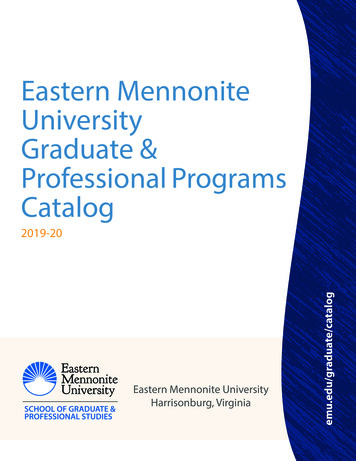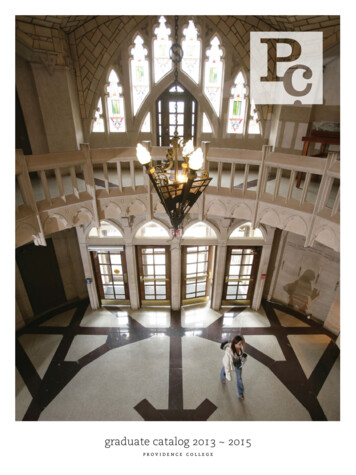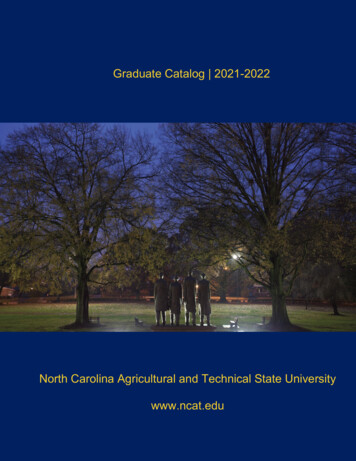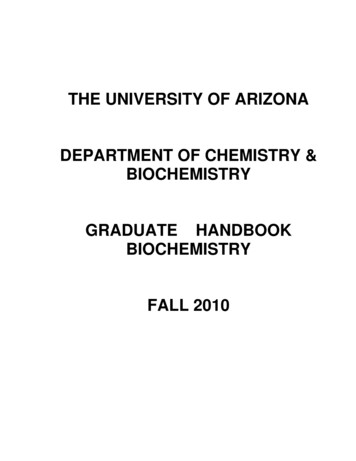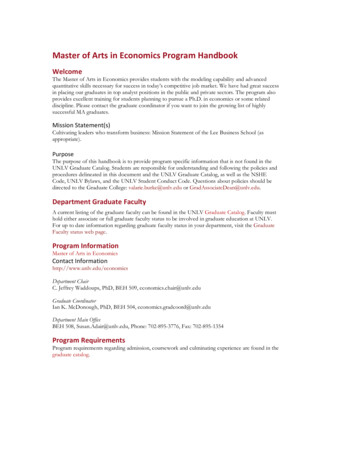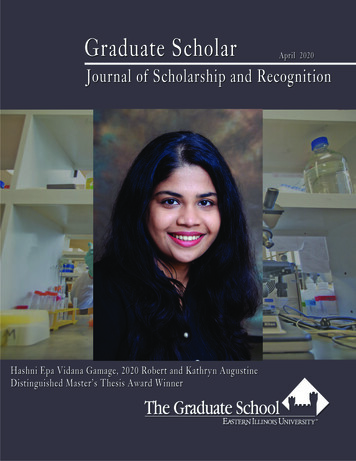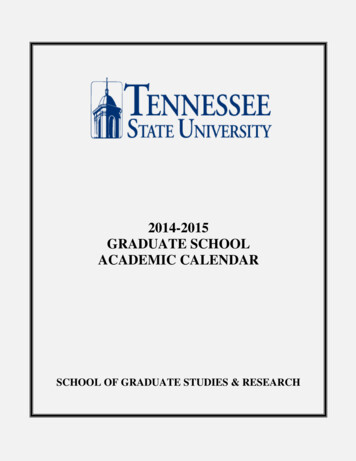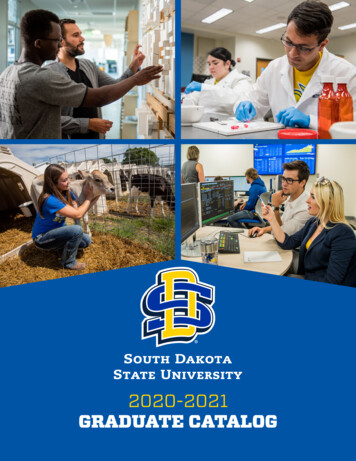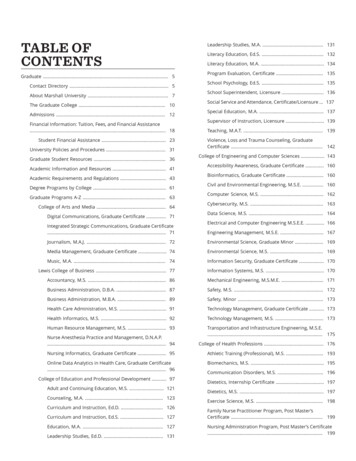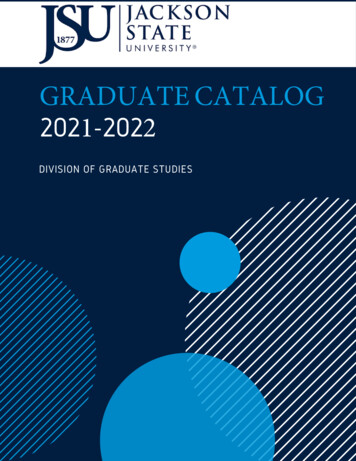
Transcription
GRADUATE CATALOG2021-2022DIVISION OF GRADUATE STUDIES
JACKSON STATEUNIVERSITY 2021-2022Graduate CatalogJackson, Mississippi 39217Volume XXII, Number 1(September 2021)ALL STATEMENTS IN THIS CATALOG ARE ANNOUNCEMENTS OF PRESENT POLICIES ONLY ANDARE SUBJECT TO CHANGE AT ANY TIME BY PROPER AUTHORITY WITHOUT PRIOR NOTICE.Jackson State University is committed to the principles of equal educationopportunity, equal employment, and affirmative action. The University does notdiscriminate on the basis of race, color, sex, disability, age, religion, national origin,veteran status, or on any other illegal basis.Jackson State University is accredited by the Southern Association of Colleges andSchools Commission on Colleges to award baccalaureate, master’s, specialist, anddoctoral degrees. Contact the Southern Association of Colleges and Schools Commissionon Colleges at 1866 Southern Lane, Decatur, Georgia 30033-4097 or call 404-679-4500for questions about the accreditation of Jackson State University.Second-class postage paid at Jackson, Mississippi 39217. The official mailing addressfor the University is as follows: 1400 John R. Lynch Street, Jackson, Mississippi 39217,telephone number (601) 979-2121. JSU's Internet homepage address: www.jsums.edu1
Graduate Catalog ContentsUniversity DirectoryThe UniversityMission/Vision StatementsStatement of Core ValuesHistory of the UniversityAccreditations and MembershipsThe Graduate SchoolGraduate AdmissionGraduate Student SupportTuition and FeesAcademic RegulationsCandidacy and Graduation RequirementsGeneral StatementsStudent Participation in Institutional GovernanceStudent CenterPublic SafetyHealth CenterVeteran and Military CenterDisability Services Center and ADA ComplianceI.D. CenterHarassmentResidence RequirementsGraduate Program DegreesResearch Organizations, Academic and Community ServicesUniversity LibrariesJSU GlobalInformation TechnologyOffice of Research and Economic DevelopmentCenter for InnovationMississippi Urban Research CenterCollege CentersUniversity Press of MississippiJSU BookstoreJSU Post OfficeJSU Development OfficeJSU Alumni Association, Inc.Institutional AdvancementUniversity CommunicationsFinancial Services/BursarHousing/Residence LifeJSU Dining ServicesLatasha Norman Center for CounselingInstitutional AssessmentCollege of BusinessMaster of Professional AccountancyMaster of Business AdministrationMaster of Business Administration – OnlineDoctoral Program in Business
College of Education and Human Development/School of Life Long LearningDepartment of Counseling, Rehabilitation & Psychometric ServicesDepartment of Educational Administration, Foundations, and LeadershipDepartment of Educational, Multicultural, and Exceptional StudiesDepartment of Elementary and Early Childhood EducationDepartment of Executive Ph.D. in Urban Higher EducationDepartment of Health, Physical Education and RecreationCollege of Health SciencesDepartment of Communicative DisordersMaster of Public Health ProgramDoctoral Program in Public HealthSchool of Social WorkMaster of Social WorkDoctoral Program in Social WorkCollege of Liberal ArtsSchool of CommunicationsDepartment of English, Foreign Languages, and Speech CommunicationDepartment of Journalism and Media StudiesSchool of Fine and Performing ArtsDepartment of MusicSchool of Social and Behavioral SciencesDepartment of Criminal Justice and SociologyDepartment of History and PhilosophyDepartment of Political ScienceDepartment of PsychologyDepartment of Public Policy and AdministrationCollege of Science, Engineering and TechnologyDepartment of BiologyDepartment of Chemistry, Physics, and Atmospheric SciencesDepartment of Civil and Environmental Engineering,and Industrial Systems and TechnologyDepartment of Electrical and Computer Engineering and Computer ScienceDepartment of Mathematics and Statistical SciencesGraduate Engineering ProgramsInterdisciplinary Computational Data-Enabled Science and EngineeringDepartment of Urban and Regional PlanningAdministration and Graduate FacultyBoard of TrusteesUniversity AdministrationThe Graduate CouncilGraduate CommitteesDivision of Graduate Studies StaffFaculty and Staff DirectoryAcademic Calendar
DIRECTORYUNIVERSITY ADMINISTRATIONOffice of the PresidentH. P. Jacobs Administration Tower, Ninth Floor (601) @jsums.eduDivision of Academic AffairsH.P Jacobs Administration Tower, Seventh Floor (601) emics@jsums.eduDivision of Business and FinanceH. P. Jacobs Administration Tower, Fifth Floor (601) ision of Institutional AdvancementH. P. Jacobs Administration Tower, Third Floor (601) ment2/Division of Information TechnologyMississippi e-Center, Second Floor (601) y2/Division of Intercollegiate AthleticsLee E. Williams Athletics and Assembly Center (601) 979-2291https://gojsutigers.com/index.aspxDivision of Research and Economic DevelopmentH.P. Jacobs Administration Tower, Sixth Floor (601) Division of Student AffairsJSU Student Center, Third Floor (601) ffairs@jsums.eduGeneral CounselH.P. Jacobs Administration Tower, Eighth Floor (601) el@jsums.eduCOLLEGES AND DIVISIONSDivision of Graduate StudiesH. P. Jacobs Administration Tower, First Floor (601) ate@jsums.edu
College of BusinessCollege of Business Building (601) siness@jsums.eduCollege of Education and Human DevelopmentJoseph H. Jackson Building (601) 979-2433https://www.jsums.edu/education/College of Health Sciences –“A Council on Education for Public Health (CEPH) accredited School of Public Health”Jackson Medical Mall (601) 979-6387https://www.jsums.edu/chs/College of Science, Engineering and TechnologyEngineering Building (601) College of Liberal ArtsDollye M.E. Robinson Building (601) 979-7036https://www.jsums.edu/liberalarts/WHERE TO GO FOR INFORMATION AND ASSISTANCE:Admissions and RecruitmentUndergraduate Admissions and RecruitmentB.F. Roberts Hall, Second Floor1-866-THEEJSU igers@jsums.eduDisability Services & ADA ComplianceSupport Services for Student and Employees and DisabilitiesJSU Student Center, Second Floor (601) es@jsums.eduAlumni and Constituency RelationsJackson State University 101 Building, Downtown Jackson, 1st floor(601) 979-2281https://www.jsums.edu/alumni/JSU Ticket OfficeMississippi Veterans Memorial Stadium(601) toffice@jsums.edu
Emergencies, Automobile Registration, Lost and Found, and Parking ViolationsDepartment of Public Safety, Public Safety Building (601) 979-2580https://www.jsums.edu/campuspolice/Books and SuppliesJSU Campus Store, JSU Student Center, First Floor (601) eer Services CenterPlacement Office, Jacob L. Reddix Building, First Floor (601) 979-2477https://www.jsums.edu/careers/JSU OnlineJackson State University 101 Building, Downtown Jackson, 5th @jsums.eduFinancial AidFinancial Aid, B.F. Roberts Hall, First Floor 1-866-THEEJSU d@jsums.eduFood ServicesCampus Dining, JSU Student Center, First Floor (601) 979-0440https://jsums.sodexomyway.com/Honors CollegeCharles F. Moore Building, First Floor (601) ficationID Center Building (601) er/Health Services/On Campus Medical AttentionHealth Services Center Building (601) hservices@jsums.eduInternational ProgramsJSU Global, C.F. Moore Building, 3rd Floor (601) @jsums.eduIntramural Sports34 Walter Payton Drive, Jackson, MS 39217 (601) x.php/competitive-sports/im-sports/WPC@jsums.edu
Latasha Norman Center for Counseling ServicesJSU Student Center, Second Floor (601) latashanormancenter@jsums.eduLibrary (Main Campus)H.T. Sampson Library (601) lStudent OrganizationsThe Center for Student Engagement and Leadership, JSU Student Center, Second Floor, Rm #2124(601) organizations/jsuengage@jsums.eduPayment of Tuition and FeesFinancial Services, B.F. Roberts Hall, Second Floor 1-866-THEEJSU fice/bursar/bursarcares@jsums.eduPostal ServicesJacob L. Reddix Building, First Floor (601) l@jsums.eduRegistrationRegistrar and Records, B.F. Roberts Hall, Second Floor 1-866-THEEJSU r@jsums.eduResidential LifeStudent Housing, Campbell College Suites North (601) jsums.eduROTC (Military Science)Dollye M. E. Robinson Bldg., Fourth Floor (601) .eduAFROTC (Aerospace Science)J.Y. Woodard eduStudent Government Association (SGA)JSU Student Center, Second Floor (601) government-association/
Student ConductDean of Students, JSU Student Center, Third Floor (601) deanofstudents@jsums.eduStudent TeachingCollege of Education and Human DevelopmentJoseph H. Jackson Building, First Floor, Room 103A (601) erquality@jsums.eduStudent Newspaper (Blue & White Flash)Student Publications, MS e-Center@JSU, First Floor (601) s.eduCampus ToursJSU Undergraduate Admissions and RecruitmentB.F. Roberts Hall, Second Floor1-866-THEEJSU .aspfuturetigers@jsums.eduVeteran and Military Student Support CenterJacob L. Reddix Building, 3rd Floor (601) terans@jsums.edu
Mission/PurposeCore ValuesHistory of the UniversityAccreditation/MembershipsJackson State ------------------------Jackson State University, a coeducational institution, issupported by the State of Mississippi. It is controlled by theBoard of Trustees of Institutions of Higher Learning, appointedby the governor. The University is supported by legislativeappropriations supplemented by student fees and federal andprivate grants.Jackson State University is located in Jackson, Mississippi, thecapital and largest city of the state. Jackson State University hasa distinguished history, rich in the tradition of educating youngmen and women for leadership, having undergone seven namechanges as it grew and developed. Founded as NatchezSeminary in 1877 by the American Baptist Home MissionSociety of New York, the school was established in Natchez,Mississippi “for the moral, religious and intellectualimprovement of Christian leaders of the colored people ofMississippi and the neighboring states.” In November 1882,the school was moved to Jackson, MS; in March 1899, thecurriculum was expanded and the name was changed to JacksonCollege.The state assumed support of the college in 1940, assigning toit the mission of training teachers. Subsequently, between 1953and 1956, the curriculum was expanded to include a graduateprogram and bachelor’s programs in the arts and sciences; thename was then changed to Jackson State College in 1956.Further expansion of the curriculum and a notable buildingprogram preceded the elevation of Jackson State College touniversity status on March 15, 1974. In 1979, Jackson StateUniversity, a public, coeducational institution, is supported bylegislative appropriations supplemented by student fees andfederal and private grants.JACKSON STATE UNIVERSITY PRESIDENTS1877-1894: .Dr. Charles Ayer1894-1911: . Dr. Luther G. Barrett1911-1927: . Dr. Zachary T. Hubert1927-1940: . Dr. B. Baldwin Dansby1940-1967: . Dr. Jacob L. Reddix1967-1984: .Dr. John A. Peoples, Jr.1984-1991: . Dr. James A. Hefner1991-1992: . Dr. Herman B. Smith, Jr. (interim)1992-1999: .Dr. James E. Lyons, Sr.1999-2000: .Dr. Bettye Ward Fletcher (interim)2000-2010: . . Ronald Mason, Jr., Esq.2010: .Dr. Leslie Burl McLemore (interim)2011-2016: . Dr. Carolyn W. Meyers2017: . Dr. Rod Paige (interim)2017-2020. Dr. William B. Bynum, Jr.2020-present: .Thomas K. Hudson, Esq.VISION STATEMENTBuilding on its historic mission of empowering diverse students tobecome leaders, Jackson State University will become recognized asachallenging, yet nurturing, state-of-the-art technologically-infusedintellectual community. Students and faculty will engage in multiinstructional/organizational collaborative learning teams and servethe global community.MISSION STATEMENTThe mission of Jackson State University, an HBCU andcomprehensive urban research university, is to provide qualityteaching, research and service at the baccalaureate, masters,specialist, and doctoral levels to diverse populations of studentsand communities using various modalities to ensure that they aretechnologically-advanced, ethical, global leaders who thinkcritically and can address societal problems and competeeffectively.STATEMENT OF CORE VALUESTraditionThe University believes that its role as a historically black universityinspires and exemplifies positive societal change.AccountabilityThe University believes in the principled exercise of leadership andthe sanctity of the public trust.LearningThe University believes in an experimentally enhanced learningenvironment where teaching, research, and service are integrated andmutually reinforcing.NurturingThe University is committed to creating a community, which affirmsand welcomes persons from diverse backgrounds and experiences andsupports the realization of their potential.ServiceThe University responds to the needs of society to the best of itsability and expects its graduates to do likewise.ResponsibilityThe University believes in and accepts its duty to enhance eachgeneration’s capacity to improve the human condition.PRINCIPLES FOR COLLEGIATE CODE OF CONDUCTJackson State University, adopted a Collegiate Code of Conduct,which is designed to enhance students’ success inside the classroomas well as in their campus life. It is intended also to assist withbuilding characteristics which will serve as guideposts for lifelongsuccess, understanding and appreciating differences among diversegroups of people, and ultimately leading to a more harmoniouslearning environment which fosters respect for others and one’s self.The tenets for this covenant are as follows:1.2.Integrity–Respect and embrace the principles ofacademic honesty.Philosophy–Embrace an academic philosophy forpositive progress toward competency in goals, critical andlogical thinking, and a commitment to excellence.9
Class Attendance–Participate actively in classroom andother learning environments and commit to becoming alifelong learner.Diversity–Celebrate the similarities and differences inour cultures, races, and ethnic origins.Communication–Encourage open communication andexpression which is guided by respect for others.Behavior–Understand that sexual or social harassmentwill not be tolerated. Always dress for success.Profanity–Discourage the use of profanity andoffensiveactions out of respect for others.Accountability–Accept personal responsibility forone’s actions and life choices and realize thatembracingnegative elements of an unhealthy lifestyle willinterfere with success.Service–Engage in civic opportunities to shareknowledge and skills with local, national, and worldcommunities.Respect–Embrace and respect tradition by participatingin rituals and observances, especially those that contributeto the history and heritage of the University. Respectothers by using cell phones and other electronic devicesonly in appropriate academic,personal, and career progress. Stay focused onyour purpose for being at the University.Safety–Be alert to threats to safety and security andinform appropriate authorities of such situations.Freedom–Respect the freedom of others to expressthemselves in matters relating to academic andphilosophical opinions.3.4.5.6.7.8.9.10.11.12.13.EXPECTED EDUCATIONAL RESULTSThe University seeks to ensure that it is responsive to theclientele it serves by producing graduates who are capable ofperforming responsibly, competently, and effectively in theirchosen careers. Jackson State University expects its graduatesto become active leaders and participants in the activities of thelocal community, their home community, and the world throughactions such as volunteerism, consultancies, civic and politicalappointments, and elections. Through numerous degreeprograms ranging from the baccalaureate to the doctoral levels,students are nurtured in an environment that supports research,exploration, and discovery in the learning process. The studentsacquire a general education and are trained to become wellrounded professionals in a variety of disciplines through theUniversity’s academic schools and colleges. Further, JacksonState University provides continuing educational opportunities,especially to non-traditional students. Training for all studentsis facilitated through research laboratories, traditional andinnovative classroom instruction, distance learning instruction,technologically advanced libraries, and through internships andalliances with external agencies andorganizations.Additionally, institutes, centers, and specialized educational andresearch services contribute to the experiential growth ofstudents and faculty.The knowledge, experiences, skills, and qualities acquired bygraduates of Jackson State University include the following: The ability to communicate effectively through both oraland written expression;The ability to demonstrate competence and creativity in adiscipline for the purpose of obtaining and repreneurial activities; The ability to analyze, synthesize, and evaluate ideas anddata using logic and quantitative reasoning;A familiarity with, and the ability to effectively use currentand appropriate technology;A social consciousness which will enable one to thinkcritically and responsibly about moral, social, economic,health, cultural, technological, and political issues and tocontribute to the improvement of society;The achievement of a level of social maturity which willempower one to exercise good human relations skills,informed decision making, motivation, and persistence;A knowledge and recognition of the value of one’s ownethnic and cultural heritage, and of the similarities anddifference inherent in a multi-cultural society; andA demonstration of leadership and professionalismthrough the pursuit of research and educationalexperiences required in one’s chose career.ORGANIZATION OF THEINSTRUCTIONALPROGRAMSThe academic programs of the University are housed in fiveacademic colleges: College of Business, College of Educationand Human Development, College of Liberal Arts, College ofHealth Sciences, and the College of Science, Engineering, andTechnology. Additional academic units include the Division ofGraduate Studies, JSUOnline, and the DuBois-Harvey HonorsCollege.ACCREDITATIONSJackson State University is accredited by the SouthernAssociation of Colleges and Schools Commission on Collegesto award baccalaureate, masters, specialists, and doctoratedegrees. Contact the Southern Association of Colleges andSchools Commission on Colleges at 1866 Southern Lane,Decatur, Georgia 30033-4097 or call 404-679-4500 forquestions about the accreditation of Jackson State University.Specific programs are accredited by the following agencies: Accreditation Board for Engineering and Technology(ABET) American Assembly of Collegiate Schools of Business(AACSB) American Chemical Society (ACS) American Psychological Association (APA) Association of Technology, Management, and AppliedEngineering (ATMAE) Computing Accreditation Commission Council for the Accreditation of Educator Preparation(CAEP) Council on Academic Accreditation in Audiology andSpeech Language Pathology (CAA) Council on Education for Public Health (CEPH) Council on Social Work Education (CSWE) Counseling for Accreditation of Counseling and RelatedEducational Programs (CACREP) National Association of Schools of Art and Design(NASAD) National Association of Schools of Music (NASM) Network of International Business Network of Schools of Public Policy, Affairs, andAdministration (NASPAA) Planning Accreditation Board (PAB)10
MEMBERSHIPS American Association of Colleges for Teacher EducationAmerican Association of Collegiate Registrars andAdmissionsOfficersAmericanBusinessCommunication AssociationAmerican Council on EducationAmerican Society for Engineering EducationAmerican Association of Collegiate Schools of BusinessAmerican Schools of ConstructionAssociation of American CollegesAssociation of Departments of EnglishAssociation of Departments of Foreign LanguageAssociation of State Colleges and UniversitiesCooperative Education AssociationCouncil of Colleges of Arts and Sciences InstituteofInternational EducationCouncil of Historically Black GraduateSchoolsCouncil of Graduate SchoolsMississippi Association of CollegesMississippi Association of Colleges for Teacher EducationMississippi Association of Collegiate Registrarsand Admissions OfficersMississippi Council of Colleges of Arts and SciencesMississippi Counseling AssociationNational Association of College Deans, Registrars andAdmissions OfficersNational Association of Veterans Programs AdministratorsNational Center for Public Service Internship ProgramNational Collegiate Honors CouncilNational Commission on AccreditingNationalCouncil for Small BusinessManagementDevelopmentNational Student ExchangeNorth American Association of Commencement OfficersSouthern Association of Collegiate Registrarsand Admissions OfficersSouthern Business Administration Association11
DIVISION OF GRADUATE STUDIESDr. Preselfannie E. Whitfield McDanielsDeanOffice: First Floor, Administration TowerTelephone: (601) 979-2455e-mail: preselfannie.w.mcdaniels@jsums.edu The Graduate CouncilGraduate AdmissionsFinancial Aid and TuitionAcademic RegulationsCandidacy and Graduation RequirementsGeneral InformationResidence RequirementsGraduate studies at Jackson State were authorized by the Board ofTrustees in 1953.Instruction was limited to EducationalAdministration and Supervision, for which the first Master ofScience in Education degrees were awarded in 1957. Dr. AugustusC. Blanks was the first Director of Graduate Studies. In 1959, Dr.Charles C. Mosley succeeded Dr. Blanks as director and eventuallyas Dean of the Graduate Program. He was followed by Dr. Oscar A.Rogers, who became Dean of the Graduate Program in 1969. In1972, the Graduate Program was elevated to school status, the resultof a comprehensive expansion effort. In that year, the Master ofBusiness Administration, the Master of Arts, and the Specialist inEducation degrees were offered for the first time, and in 1974, theMaster of Science degree was offered. In 1982 the first Doctor ofEducation Degree was conferred in Early Childhood Education. Dr.Leslie Burl McLemore was appointed Dean of the Graduate Schoolin August, 1984. Dr. Bettye Ward Fletcher was appointed Dean ofthe Graduate School in August, 1991. The Environmental ScienceDoctoral Program was implemented in the Fall of 1992 as aninterdisciplinary program based upon the integration of natural andapplied sciences. The Master of Social Work degree was institutedin August, 1995. In 1996, Dr. Lula S. Collier served as the InterimDean of the Graduate School. The Doctor of Philosophy in SocialWork began in August, 1997. Dr. Dorris R. Robinson-Gardnerbecame Dean of the Graduate School in August 1997, and remainedin that position until the spring semester of 2018 (then, the Divisionof Graduate Studies). After serving nine months as Interim GraduateDean, Dr. Preselfannie E. Whitfield McDaniels became GraduateDean April 2019. Before this time, Dr. Darcie Bishop briefly servedas Interim Dean of the Division of Graduate Studies from April-June2018. The University is classified as a research university (highresearch activity) by the Carnegie Foundation.The Division of Graduate Studies has supervision of all graduatework at the University. The Division of Graduate Studies iscomposed of the departments which offer graduate instructionleading to masters’, educational specialist, and doctoral degrees.The faculty of the Division of Graduate Studies consists of thosefaculty members in the departments who are qualified to teach anddo research on the graduate level. Members of the graduate facultyengage in scholarly pursuits in terms of research, writing, publishing,and participating in professional organizations.The University is authorized by the Board of Trustees of Institutionsof Higher Learning to offer the Doctor of Education Degree in EarlyChildhood Education, the Doctor of Philosophy Degree in BusinessAdministration, Chemistry, Clinical Psychology, Computational ministration, Engineering, Environmental Science, PublicAdministration, Social Work, Urban Higher Education, and Urbanand Regional Planning and the D.P.H. in Public Health.The Graduate CouncilThe Graduate Council is responsible for the development andcoordination of general policies and procedures for graduateprograms and the maintenance of uniform standards for theadmission of students and for the awarding of graduate degrees. Itis, therefore, the responsible body to recommend, initiate, develop,and approve graduate programs.Acting with the Graduate Dean, the Graduate Council may initiateplans for improvement of graduate instruction, set standards for theGraduate Faculty, and, in general, oversee the proper functioning ofthe Division of Graduate Studies.The Graduate Council consists of a representative, usually theDepartment Chair, from each department and program offeringgraduate degrees. At the Annual University Fall Faculty Seminar,an additional representative from each School can be elected for oneyear by the assembled graduate faculty. The Graduate Dean alsoappoints for one or two year terms additional members from thefaculty at large in order to ensure balanced representation. Twograduate students are appointed by the Dean for one year. Theserepresentatives act in an advisory capacity and are charged with thetransmittance to their departments of the deliberations of theGraduate Council and are also charged to bring recommendations tothe Council.During the academic year, the Graduate Council meets during thefollowing months: October, November, February, and April.Special meetings of the Council may be called by the Dean or by amajority of the Council members.The Graduate FacultyThe Graduate Faculty consists of the President, Provost, theacademic deans and those members of the general faculty who, bytheir scholarly attainments in their own fields of specialization havedemonstrated their competence to offer graduate instruction.The purpose and functions of the Graduate Faculty, within limitsestablished by the Board of Trustees, are to offer graduate courses,supervise thesis and dissertation research, and advise the GraduateCouncil and the Graduate Dean on the establishment of policiesrelating to graduate education. The major advisory functions of theGraduate Faculty are carried on by committees appointed by theGraduate Dean. Appointment to the Graduate Faculty is made bythe Provost.12
GRADUATE ADMISSIONSAdmission is granted jointly by Graduate Studies and the program inwhich the student plans to study. Each program has its ownprocedures for evaluating applications.Once all requiredinformation is received by Graduate Admissions in the Admissionsportal, admit decisions can be made at all required levels. OnceGraduate Studies receives a recommendation from the graduatefaculty of the department and the College Dean or designee,applicants are notified by the Graduate Dean of the decision to admit,conditionally admit, or deny. Admission decisions are valid for 12months for purposes of initial enrollment.The Graduate Application can be submitted online by visiting theJackson State University Graduate Studies we
name was then changed to Jackson State College in 1956. Further expansion of the curriculum and a notable building program preceded the elevation of Jackson StatemutuallyCollege to university status on March 15, 1974. In 1979, Jackson State University, a public, coeducational institution, is supported by
